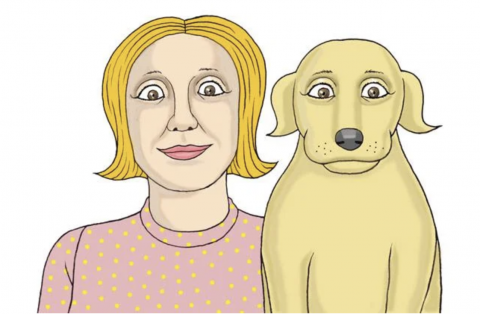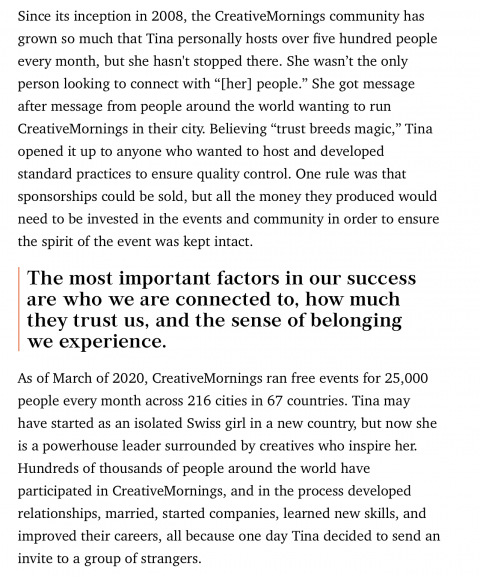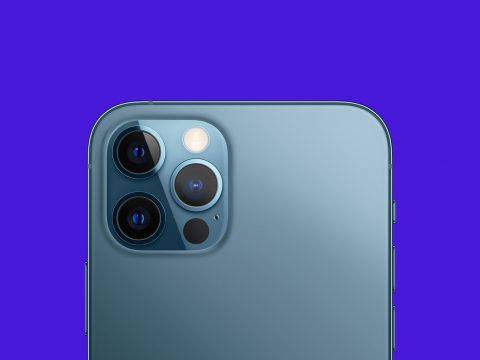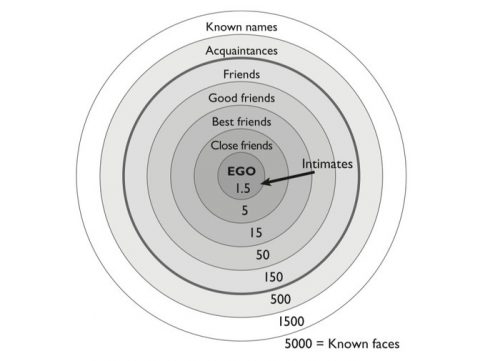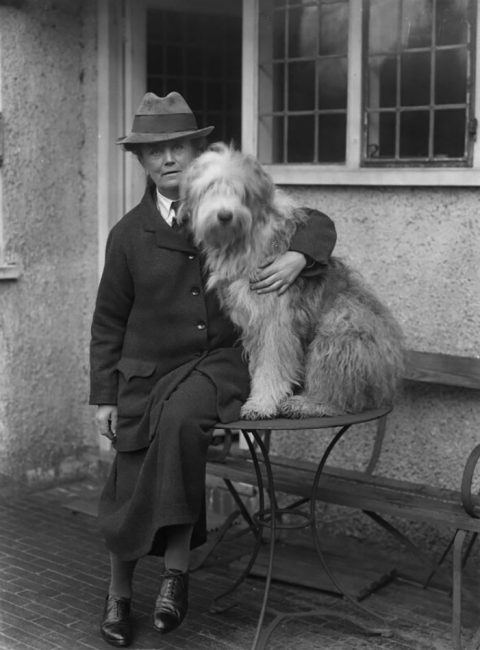This article on What Makes People Look Like Their Pets? by Jesse Bering made me chuckle.
CreativeMornings on Oprah
My heart is overflowing with all of the feelings: The story of CreativeMornings is featured in an article on Oprah today.
Thank you Jon Levy for generously writing an entire chapter about us in your book You’re Invited.
You can read the article here.
I will now go and cry and dance in my living room and send oodles of gratitude to our global volunteer community for making this happen.
How to Use ProRAW on Your iPhone 12 Pro
“Serious iPhone photographers have been able to shoot in RAW for some time via third-party apps like Halide. But what makes the new ProRAW feature special is that you don’t need to use another camera app—ProRAW images can be captured in the iPhone’s native camera app. More importantly, it utilizes all of Apple’s advanced computational photography features built into the iPhone.
Close Friendships
This article on how many close friendships one can maintain just made me block out time on my calendar today to map out my friends. What an excellent and thought provoking read.
These two facts made me perk up:
“Falling in love will cost you two friendships.” and “It takes about 200 hours of investment in the space of a few months to move a stranger into being a good friend.”
(via my friend Casper who shares the best stuff on Twitter)
The Zodiac Man
I am wildly fascinated by this graphic, found in an article called The Zodiac Man.
Image credits: A woodcut recreation of an image by A. G. de Brocar, 1495, in Johannes de Ketham’s Libro de medicina (1517).
“Work From Near Home”
“Many workers won’t be returning to an office anytime soon, but having them relocate their efforts entirely to their homes for the long run might be unexpectedly misery-inducing and unproductive. We need to consider a third option for our current moment, and if we look to authors for inspiration then one such alternative emerges: work from near home.”
What if remote work didn’t mean working form home? by Cal Newport
There’s a Name for the Blah You’re Feeling
“Languishing is a sense of stagnation and emptiness. It feels as if you’re muddling through your days, looking at your life through a foggy windshield. And it might be the dominant emotion of 2021.”
This article by Adam Grant!
Arbitrary Stupid Goal
A goal that isn’t too important makes you live in the moment, and still gives you a driving force. This driving force is a way to get around the fact that we will all die and there is no real point to life.
But with the ASG there is a point. It is not such an important point that you postpone joy to achieve it. It is just a decoy point that keeps you bobbing along, allowing you to find ecstacy in the small things, the unexpected, and the everyday.
What happens when you reach the stupid goal? Then what? You just find a new ASG.
– Tamara Shopsin
Seen here: Something to look forward to, by Austin Kleon
Success at School vs. Success in Life
Read the article that goes with the above video here.
With a Spirit of Generosity
“Generosity sometimes involves personal sacrifice, but it is a sacrifice that feels different than cheap dental floss. “Generous generosity” can actually move us more toward embracing uncertainty. If having, or keeping, what is “mine” creates a sense of certainty, then giving it away involves sacrificing that security at some level. And “mine” can extend beyond money or stuff. What about “my” time? “My” plans? “My” life? If I give it away, will my own needs be met? At the most basic level, giving is an act of deep-rooted trust. It is an energy that directly combats a spirit of scarcity.
Someone once said that it is not “whether you have it” but “how you have it.” Do we hold it in such a way that we are willing to part with it? It seems that our level of detachment often informs our level of generosity. But it is not an exact science. In other words, generosity is not a line item in our budget for which we write a calculated check each month (although that’s a good place to start). Rather, heart filled giving is really quite fluid and requires an ongoing spirit of awareness. In our humanity, we do it imperfectly, but we hope others are generous with us when we miss the mark.”
With a Spirit of Generosity, by Jen MacNab
Ethel Smyth
Beautiful Read: Dignity, Daring, and Disability: The pioneering queer composer and defiant genius Ethel Smyth on making music while going deaf. Thank you Maria!
“Jootsing”: The Key to Creativity
As individuals, if we want to be creative, we need to give ourselves space to play and experiment without a set agenda. Amos Tversky famously said that the secret to doing good work is being a little unemployed so you always have hours in the day to waste as you wish. During that wasted time, you’ll likely have your best, most creative ideas.
5-Step Road Map For Saying No
1. Remind yourself that time is valuable and once it’s spent you absolutely can’t get it back.
2. Ask yourself: “Would I be willing to do this thing tomorrow?” It’s easy to sign yourself up for something in April when it’s only September. Do your future self a favor and try this little exercise.
3. Respond quickly. Don’t leave people hanging once you know you’re saying no.
4. Own your “no” if it’s not a priority (because something else actively is): “Thanks so much for thinking of me. I’m not going to be able to take this on, but I wish you the best with X.”
5. Reframe your “no” to assuage your guilt (if it’s something you genuinely wish you had time for). Acknowledge that this commitment is significant to you, even if you’re not taking it on. A good sample script: “This is so important that it deserves someone’s full energy, and since I can’t do that because I have XYZ other things, I would be dishonoring the importance of this event/role/weekend getaway by saying yes.”
Awkward
“Social skills are like any other kind of ability in that they require practice.” Smith writes in the latest edition of her newsletter, Inside Your Head. “And by this point in the pandemic, starved of normal, everyday social interactions — running into an acquaintance on the street, sharing an elevator with a co-worker, or making small talk with a barista — most of us are pretty rusty.”
We’ve already gotten kind of awkward. But over the next few months, with even fewer chances to practice being social in person, we’re all about to get super awkward.
5 Levels of Communication
Level 1: Ritual
Level 2: Extended Ritual
Level 3: Content (or Surface)
Level 4: Feelings About Content
Level 5: Feelings About Each Other
Interesting read: Richard Francisco’s Five Levels of Communication maps out a series of “levels” that represent increasing degrees of difficulty, risk, and potential learning in our interactions.
Water Has Three States
“Water has three states, but you know, not really only three—clouds, fogs, mist, rain, and many others. A rainbow is related to water. Our bodies are 70% water, and our planet is also 70% water on the surface. We’re almost like a puddle of water. As you know, those different states of water can look very beautiful, but sometimes they can be very violent, like a tsunami.”
– Ryuichi Sakamoto
I Miss My Desk
“Even more importantly, desks enable collaboration. To be at your desk is to be present, in the world, at a place in time – to be available for an impromptu brainstorm, feedback session, or gut check. That face-to-face cooperation brings a human touch to our work that can’t be replaced by all the Slack messages, Zoom calls, or Google Docs in the world. It’s why (at least during normal times) so many freelance professionals choose to pay for a desk in a coworking space. With others around it, a desk becomes more than a desk; it becomes a community. Desks are how we interface. The things placed, whether carefully or incidentally, on their surface – the books, tools, decorations, pictures, half-eaten salads, and unopened mail – serve as ambient communication to co-workers about our lives.”
I Miss My Desk (and So Should You), by Brandon Lori
Self-directed, Project-basedLearning
“We now have a chance to turn this fall’s back-to-school (in the Northern Hemisphere) into self-directed, project-based learning instead of a rush toward compliance and butts in chairs and pencils on tests. Shipping the project, proving it works and then doing it again. Learning by doing. Self-direction unlocks our ability to contribute for a lifetime, whereas preparing for the test ensures that we will always be at the mercy of the person who is giving the test. People are not entitled to their own facts–and understanding helps us discover the ones that matter.”
Self-directed, project-based learning, by Seth Godin
Exit To Community
“If you’re forming a startup, there are generally two kinds of stories to choose from about what the startup is for. Keep in mind that startups are companies that are trying to take over some subsection of the world. It’s ambitious stuff, so they tend to take on lots of early investment. They get somebody to give them a lot of money so they can hit the market with disproportionate force. And in order to pay that investment back, they need what’s called an “exit,” which usually comes in two forms: You’re either acquired by a larger company or you go public, selling your company on a market where people can trade your shares based on their speculations about what it’s worth. In both cases, you’re passing the company that you’ve worked to build off to new owners, who in turn might be buying it just to convince future buyers to pay even more for it later. It’s a weirdly normal pyramid scheme of capitalism.
What if there were another way? What if a startup that successfully builds a community could opt for an exit to ownership by that community?”
This is a fascinating read: Exit To Community, by Nathan Schneider
Water Has Three States
“Water has three states, but you know, not really only three—clouds, fogs, mist, rain, and many others. A rainbow is related to water. Our bodies are 70% water, and our planet is also 70% water on the surface. We’re almost like a puddle of water. As you know, those different states of water can look very beautiful, but sometimes they can be very violent, like a tsunami.”
– Ryuichi Sakamoto
Ambiguous Loss
That means reckoning with what’s called ambiguous loss: any loss that’s unclear and lacks a resolution. It can be physical, such as a missing person or the loss of a limb or organ, or psychological, such as a family member with dementia or a serious addiction.
“In this case, it is a loss of a way of life, of the ability to meet up with your friends and extended family,” Boss says. “It is perhaps a loss of trust in our government. It’s the loss of our freedom to move about in our daily life as we used to.” It’s also the loss of high-quality education, or the overall educational experience we’re used to, given school closures, modified openings and virtual schooling. It’s the loss of rituals, such weddings, graduations, and funerals, and even lesser “rituals,” such as going to gym. One of the toughest losses for me to adapt to is no longer doing my research and writing in coffee shops as I’ve done for most of my life, dating back to junior high.
“These were all things we were attached to and fond of, and they’re gone right now, so the loss is ambiguous. It’s not a death, but it’s a major, major loss,” says Boss. “What we used to have has been taken away from us.”
Your ‘Surge Capacity’ Is Depleted — It’s Why You Feel Awful, by Tara Haelle
Good Trouble
“Do not get lost in a sea of despair. Be hopeful, be optimistic. Our struggle is not the struggle of a day, a week, a month, or a year, it is the struggle of a lifetime. Never, ever be afraid to make some noise and get in good trouble, necessary trouble.”
– John Lewis
Interracial Friendships
“You don’t get to pick your family of origin or the place you grow up. But you do get to choose your friends, and those choices say something about the kind of world you want for yourself. This is one of the many ways friendship is political. We’re not just talking about whether you have people in your life who voted for the opposite party or whether you’re carpooling to the protest march with your friends. We’re talking about small-p politics, or “the total complex of relations between people living in society,” as the dictionary puts it. White people can’t be surprised that white supremacists are marching in the streets if their own lives are racially segregated. The choices that each of us makes every day about who we include in our lives end up shaping the larger world we live in.”
There’s a Divide in Even the Closest Interracial Friendships Including ours, By Aminatou Sow and Ann Friedman
